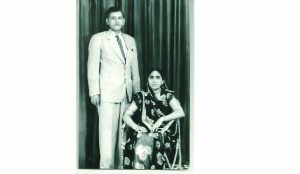 TODAY, we profile one of the family businesses that has been running in this country from as far as the early 1930s and has been passing through family members from one generation to another, growing from a small business into a medium one.
TODAY, we profile one of the family businesses that has been running in this country from as far as the early 1930s and has been passing through family members from one generation to another, growing from a small business into a medium one.
A medium business, according to Zambia Revenue Authority (ZRA), is one whose annual earnings lie between K50,000 and K800,000.
Family businesses are established primarily to give a life line of wealth creation in families to escape the life associated with poverty and, because of this, it is imperative that a family business is sustained through and through by way of transferring skills from one generation to another.
But in this country the situation has been the opposite, it has been observed that several well run personal businesses have gone under simply because the founder of such a business had died.
And this has resulted in the scramble for the assets left over after the demise of a business owner and, as a result, the families attached to the founder are usually left suffering.
Today in our business column we showcase a family business legacy of laundry and dry cleaning that has been passing through the Ranchod family in Lusaka.
The Ranchods came from the Raj tribe in India who are horseback warriors.
Lusaka Laundry is a household name in as far as laundry and dry cleaning is concerned in this country and its establishment is traced way back to the early 1930’s.
Before we look exclusively at the family legacy of the Lusaka laundry business, I thought it wise to describe what laundry and dry cleaning is all about.
Many of us associate laundry and dry cleaning to one way of cleaning men’s and women’s suits, however at a closer look of the expert’s explanation of laundry and dry cleaning, it suggests a more separation of cleaning activities between laundry and dry cleaning.
Dry cleaning involves the cleaning of men’s suits, single jackets, trounsers, women’s suits, dresses in a machine by using a specialised chemical while, the laundry involves the washing of linen like bedsheets, pillow cases, towels and especially white linen by applying special detergent using a washing machine.
The early 20th century witnessed the exodus of most Indians from their country into other countries to search for greener pastures and the Ranchod family settled in Dar-es-Salaam in Tanzania, then called Tanganyika, carrying on their shoulders a laundry and dry cleaning business which was being performed manually.
Traditional dry cleaning and laundry business knowledge which was being carried out by the Ranchods, involved using chemicals called basin and turpentine for dry cleaning and for laundry a regular powdered soap and the laundry and dry cleaning were being done manually, such as stone washing.
In search of further greener pasture, a young man in his early 20’s by the name of Pragji Ranchod, left Dar-es -Salaam and headed for Zambia by then called Northern Rhodesia and set up the first ever laundry shop in Lusaka in the year 1936.
The shop was set up on Chiparamba Road which in those days was called Livingstone Road. The road runs through Cha Cha Cha and Freedom Way in the town centre. Mr Ranchod bought the plot from the savings he came with from Tanzania.
With hard working and deeper knowledge of manual traditional dry cleaning and laundry imbedded in his head, Mr Ranchod’s innovative technical ideas saw him modify the manual dry cleaning and laundry by cutting drums and started rolling them in the mechanised way to perform both dry cleaning and laundry and the improvement was noticed in his latest technology by then.
Lusaka and Grand hotels marked the first major customers for Lusaka laundry in those days.
With help from his wife Fulliben a teacher by profession, he established the first laundry and dry cleaning business which also saw the white community become major walk-in customers.
Between the two of them, they bore five children three males and two females, After successfully establishing the laundry and dry cleaning business, Mr Ranchod died at the age of 61 in the year 1963.
Mrs Pragji Ranchod became a pillar of Lusaka Laundry but was however being assisted by his two eldest sons by the names of Vithal Pragji Ranchod and Kantilar Pragji Ranchhod.
As age caught up with Mrs Ranchod, the two eldest sons took over control and operations of Lusaka Laundry.
As business improved, they brought in automated machines for both laundry and dry cleaning and bought the property from where the present Lusaka laundry is up to the corner where Chiparamba and Cha Cha Cha Road joins on the right hand side
The Ranchod family together with the Kanjombes who were neigbhours also helped in the struggle for independence by providing secretarial and transport assistance to first president Kenneth Kaunda and his vice Simon Kapwepwe as acknowledged in a letter they wrote to Lancaster house in London outlining the role the Indian community was playing in the struggle for independence then.
The late 60’s and the whole of the 70’s, saw Lusaka laundry increase in business stature and equally, the business volume increased resulting in savings which the two brothers used to diversify into retail of imported clothing by opening a retail outlet called west-end outfitters which became a very popular retail outfit in Lusaka.
In the early 80’s Lusaka Laundry was taken over in terms of administration by a young man in his early 20’s called Rajen Kantilal Ranchod a son of Kantilal Pragji Ranchhod one of the two brothers and his cousin who has since settled in America.
Modern technology of investment has been poured into Lusaka laundry and this can be seen by the state of art equipment that has been brought in, to match with the present day laundry and dry cleaningtechnology.
Whereas, previously it used to take three to four days to collect laundry today it takes only one or two days because of the computerisd machines that have evolved with time.
Mr Rajen Kantilar Ranchod is in his early 50’s and is still the Chief Executive Officer of Lusaka Laundry.
For any comments contact 0950458228 or e-mail: wklpublications699@gmail.com







